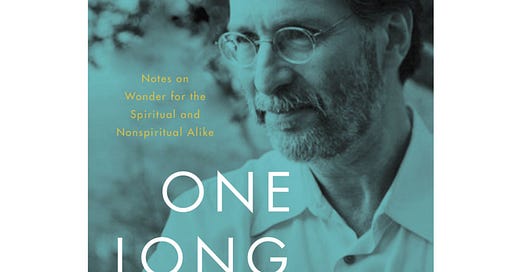In Honor of Brian Doyle: Reflections on “One Long River of Song”
I have not yet met Brian Doyle, writer, essayist, lover of the long river that is a meandering sentence, and likely won’t for a while, on…
I have not yet met Brian Doyle, writer, essayist, lover of the meandering sentence, and likely won’t for a while, on account of the fact that he is hanging out with our mutual friend Jesus at the moment, but I look forward to the day. Doyle has written one of my very favorite sentences in the world:
“You can brick up your heart as stout and tight and hard and cold and impregnable as you possibly can and down it comes in an instant, felled by a woman’s second glance, a child’s apple breath, the shatter of glass in the road, the words I have something to tell you, a cat with a broken spine dragging itself in the forest to die, the brush of your mother’s papery ancient hand in the thicket of your hair, the memory of your father’s voice early in the morning echoing from the kitchen where he is making pancakes for his children.”
This is from Joyas Voladoras, which is one of two of Mr. Doyle’s essays I read in a creative nonfiction class during my failed attempt to obtain a creative writing minor in undergrad. The other is Leap, an essay about the souls who jumped from the burning towers on September 11, 2001. As I re-read “Leap” going through his new posthumous collection, One Long River of Song, the realization graced me that it was this essay that made me want to write essays. I thought essay meant academic, boring. I didn’t know you could write with perspective, that you could say things like, “Their hands reaching and joining are the most powerful prayer I can imagine,” that I could be brought to tears by a two-page piece about a single image. It wasn’t only Doyle; we read plenty of non-fiction that semester that quickened my pulse or moved me to tears. But his was the first, and his style and project are the closest approximation to what I want to do when I write, despite my years of telling myself and others I want to write like David Foster Wallace and Joan Didion. I’m here to set the record straight: Brian Doyle rules.
What makes Brian (can I call him Brian?) a great writer? Is it those sentences stacked with clauses? Is it his “abuse” of punctuation? His essays are not particularly long; the longest by far in River of Song is fifteen pages long. Most hover around three. Which is great for packing 81 total essays into a 249-page book. They do not provide large scale cultural analysis or mega-issues. Most of his subjects are small, simple: playing basketball, his children, playing basketball with his children, hawks and other animals. Even his essays about big subjects, like Leap, like his many on God and religion, focus on the tactile: two hands grasping for each other, God as a post-man, the Dalai Lama watching soccer. The Divine is not distant, or at least the distant parts of him aren’t the ones that interest Brian. They are unrelentingly optimistic, you might almost say naive, if he were a younger writer and he weren’t so alarmingly humble. Only one essay in the whole collection could be considered critical; the rest locate something good, something true, something noble amidst the pervasive wickedness of the world, and hold onto it for dear life. Dear life. That was Brian’s project, as I understand it, to remind us that life is dear. And it is.
One Long River of Song is one long tribute to the beauty and the grace hidden in life. It is not that he does not see the evil of life; it is there, lurking in the folds. But he is compelled by the good he sees, moved by it, forced to document it with wit and charm. His writing swings from grandiose verbosity to ordinary, everyday language with an ease and sincerity that speaks to the man. I’ve never read a writer whose self is so evidently on display in his writing, in a good way. He defeated self-consciousness, as I wish to do.
I close with an imperative and a quote.
First, read Brian Doyle.
Second, because of stuff like this:
yesterday my daughter and I played two on two against my sons on the lovely burnished oak floor of our dining room, the boys who just learned to walk staggering like drunken sailors and falling at the slightest touch, my daughter loud lanky in her orange socks sliding from place to place without benefit of a dribble but there is no referee, only me on my knees, dribbling behind my back and trick-dribbling through plump legs of the boys, their diapers sagging, daughter shrieking with glee, boys confused and excited, and I am weeping weeping weeping in love with my perfect magic children
Which I should tell you goes on like that for nearly three times a long, a page-long sentence of unabashed love, the sort of love which can never be taken from us.




